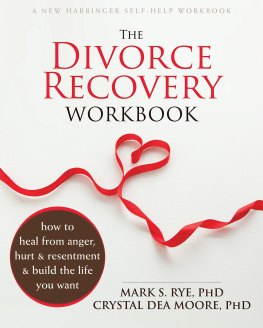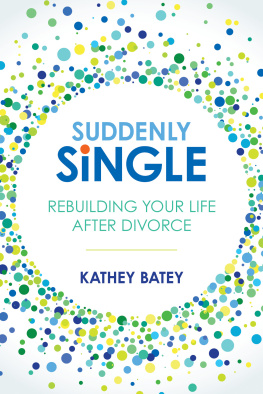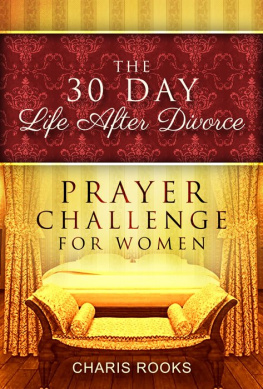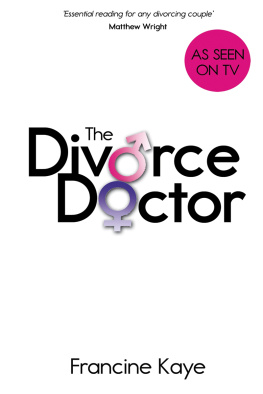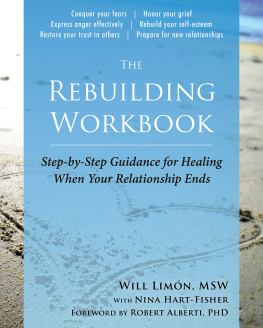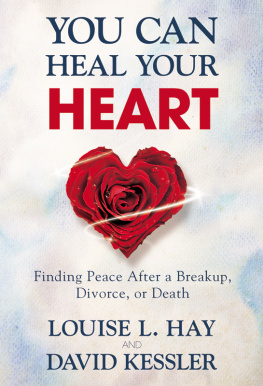Mark S. Rye, PhD, is associate professor of psychology at Skidmore College in Saratoga Springs, NY. He received his PhD in clinical psychology from Bowling Green State University in Bowling Green, OH, and is a licensed clinical psychologist. His research in the field of positive psychology, which focuses on how forgiveness and gratitude relate to mental health, has been funded by the John Templeton Foundation and the Fetzer Institute.
Crystal Dea Moore, PhD, is professor, chair of the department of social work, and holds the endowed Quadracci Chair of Social Responsibility at Skidmore College in Saratoga Springs, NY. She received her PhD in social welfare from the University at Albany, State University of New York, and is a licensed clinical social worker.

The Divorce Recovery Workbook skillfully integrates uncovering feelings, mindfulness, and compassion to allow the reader to navigate the difficult necessity of post-divorce forgiveness. A very thoughtful, useful, and helpful book.
Frederic Luskin, PhD, director of the Stanford Forgiveness Projects, and author of Forgive for Good
Give this one five stars! Rye and Moore have integrated the most up-to-date psychology research into a down-to-earth, practical workbook filled with user-friendly exercises and a spirit of hope. This will be an invaluable tool for any man or woman struggling with the pain of divorce.
Kenneth I. Pargament, PhD, professor of psychology at Bowling Green State University, and author of Spiritually Integrated Psychotherapy
In The Divorce Recovery Workbook, Rye and Moore provide an excellent applied workbook for you if youve been dealing with the loss of a marriage or long-term relationship. In fact, as I read the manuscript, I could not help but think that the workbook could help deal with many losses, not just divorce. It adapts evidence-based interventions from positive psychologyforgiveness of self and others, gratitude, benefit-finding, happiness, mindfulness, meaning-finding, and self-compassioninto dealing with your loss. It is a wonderful adaptation of respected scholarship so that you can benefit by it.
Everett L. Worthington, Jr., PhD, professor and director of the counseling psychology program at Virginia Commonwealth University, and author of Moving Forward
Divorce is painful, but it can be navigated with compassion. This wonderful book contains concrete tools that will help you learn how to support yourself through this trying time, so youll emerge happier, healthier, and whole again.
Kristin Neff, PhD, associate professor of human development and culture, University of Texas at Austin, and author of Self-Compassion
Divorce is a process that often leaves one emotionally raw, hurt, and angry. Its critical that you take the time to heal from the emotional fallout of divorceand, all too often, people dont do the work or know what to do. If you want an effective action plan and strategies to move forward to build a better life post-divorce, this book is it! Its a must-read for all my divorce coaching clients.
Deborah Moskovitch, divorce coach and author of The Smart Divorce
Reading the book is a sheer delight. You feel like the authors are sitting and talking with you about the struggles of divorce, and ever so gently and professionally offering a series of well-proven, positive psychology remedies for coping. This is a positive, insightful, and compassionate approach.
Loren L. Toussaint, PhD, associate professor of psychology at Luther College, and associate director of Sierra Leone Forgiveness Project
Rye and Moore have developed a powerful and practical resource for those struggling with the pain of divorce. This workbook is personally engaging and easy to read, and it is firmly grounded in empirical research. Rye and Moore manage to strike just the right balance.
Julie Exline, PhD, professor of psychology and director of clinical training at Case Western Reserve University

Publishers Note
This publication is designed to provide accurate and authoritative information in regard to the subject matter covered. It is sold with the understanding that the publisher is not engaged in rendering psychological, financial, legal, or other professional services. If expert assistance or counseling is needed, the services of a competent professional should be sought.
The self-compassion scale in Exercise 3.2 is adapted with permission from the work of Kristin Neff.
Exercise 3.5, Letting Go of Labels Through Realizing Our Interconnectedness, is adapted from SELF-COMPASSION by Kristin Neff, PhD. Copyright 2011 by Kristin Neff. Reprinted by permission of HarperCollins Publishers and Hodder and Stoughton Limited.
Distributed in Canada by Raincoast Books
Copyright 2015 by Mark S. Rye and Crystal Dea Moore
New Harbinger Publications, Inc.
5674 Shattuck Avenue
Oakland, CA 94609
www.newharbinger.com
Cover design by Amy Shoup
Acquired by Wendy Millstine
Edited by Brady Kahn
All Rights Reserved
Library of Congress Cataloging-in-Publication Data
Rye, Mark S.
The divorce recovery workbook : how to heal from anger, hurt, and resentment and build the life you want / Mark S. Rye, Crystal Dea Moore.
pages cm
Includes bibliographical references.
ISBN 978-1-62625-070-3 (paperback) -- ISBN 978-1-62625-071-0 (pdf e-book) -- ISBN 978-1-62625-072-7 (epub) 1. Divorce--Psychological aspects. 2. Divorced people--Psychology. 3. Adjustment (Psychology) I. Moore, Crystal Dea. II. Title.
HQ814.R94 2015
--dc23
2014046562
Crystal would like to dedicate this book to Jeffrey and Gavin and thank them for continuing to teach her the meaning of family and forgiveness.
Mark would like to dedicate this book to his parents, Bob and Francie, who have inspired him to learn positive ways of coping with lifes challenges.
Acknowledgments
Writing this book has given us a wonderful opportunity to practice the positive psychology strategy of gratitude. Many people gave generously of their time and talent to assist us on this project, and wed like to take a moment to express our appreciation.
We want to begin by thanking our fantastic editorial team at New Harbinger Publications. This book would not have been written without Wendy Millstine, who first approached us about the possibility of writing a book, helped us shape the initial concept, and successfully pitched the book to her colleagues. Were also deeply indebted to Melissa Kirk and her fellow editors who provided us with helpful and encouraging feedback throughout the writing process. They struck a perfect balance between allowing us freedom to find our own style and providing us with invaluable guidance along the way. In addition, were grateful for the excellent work of our copy editor, Brady Kahn.
We were touched by Teresa Hartnetts generous spirit and her willingness to take time out of her busy schedule to teach us the ins and outs of book publishing. No amount of chocolate chip cookies can adequately compensate Teresa for her assistance, but that wont stop us from sending more.
We appreciate the generous funding that the Fetzer Institute and the John Templeton Foundation provided for our research on forgiveness and postdivorce adjustment.

